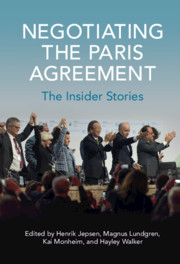Book contents
- Negotiating the Paris Agreement
- Negotiating the Paris Agreement
- Copyright page
- Contents
- Figure
- Editors
- Contributors
- Acknowledgments
- Foreword
- 1 Introduction
- 2 The Paris Negotiations: Background and Context
- 3 The French COP 21 Presidency
- 4 Mission: Adoption with Ovations: The Contribution of the UNFCCC Secretariat to the Achievement of the Paris Agreement
- 5 The Paris Agreement and China’s Imprint
- 6 The EU’s Role in the Paris Agreement
- 7 The United States: Interesting Processes and Techniques Lined the Road to Paris
- 8 COP 21 – Complaints and Negotiation: The Role of the Like-Minded Developing Countries Group (LMDC) and the Paris Agreement
- 9 The Staircase of Paris
- 10 The Battle for Small Island Developing States
- 11 The High Ambition Coalition
- 12 The Power of Civil Society
- 13 Business: Creating the Context
- 14 Why Did They Finally Reach Agreement?
- 15 Conclusion: The Landscape of Multilateral Agreement in Paris and Beyond
- Afterword
- Appendix: The Paris Agreement
- References
- Index
12 - The Power of Civil Society
Published online by Cambridge University Press: 24 September 2021
- Negotiating the Paris Agreement
- Negotiating the Paris Agreement
- Copyright page
- Contents
- Figure
- Editors
- Contributors
- Acknowledgments
- Foreword
- 1 Introduction
- 2 The Paris Negotiations: Background and Context
- 3 The French COP 21 Presidency
- 4 Mission: Adoption with Ovations: The Contribution of the UNFCCC Secretariat to the Achievement of the Paris Agreement
- 5 The Paris Agreement and China’s Imprint
- 6 The EU’s Role in the Paris Agreement
- 7 The United States: Interesting Processes and Techniques Lined the Road to Paris
- 8 COP 21 – Complaints and Negotiation: The Role of the Like-Minded Developing Countries Group (LMDC) and the Paris Agreement
- 9 The Staircase of Paris
- 10 The Battle for Small Island Developing States
- 11 The High Ambition Coalition
- 12 The Power of Civil Society
- 13 Business: Creating the Context
- 14 Why Did They Finally Reach Agreement?
- 15 Conclusion: The Landscape of Multilateral Agreement in Paris and Beyond
- Afterword
- Appendix: The Paris Agreement
- References
- Index
Summary
Jennifer Morgan describes how civil society worked to secure a fair and ambitious multilateral agreement as seen from her perspective as Global Director of the Climate Program at the World Resources Institute at the time. In her view, civil society had four different roles and functions: civil society (1) gathered together idea generators, analysts, and researchers ahead of time, (2) provided informal intelligence and diplomatic service combined with high-trust networks, (3) brought the voices of people into the negotiations, and (4) explained COP 21’s complexities and alerted the outside world. Morgan concludes that no single function or role of civil society made the difference in Paris, but the combination of them all did so. She highlights the “bursting of the UNFCCC bubble” as a main function and assesses that the 1.5°C goal, came into the Paris Agreement as a result of peoples’ voices being heard and listened to. Without the NGO contribution, it would have been much more difficult, perhaps impossible, to sow the seeds of change. Morgan suggests that civil society can use its principled and objective-based approach to its advantage and listen to allies in their movement.
- Type
- Chapter
- Information
- Negotiating the Paris AgreementThe Insider Stories, pp. 245 - 264Publisher: Cambridge University PressPrint publication year: 2021



